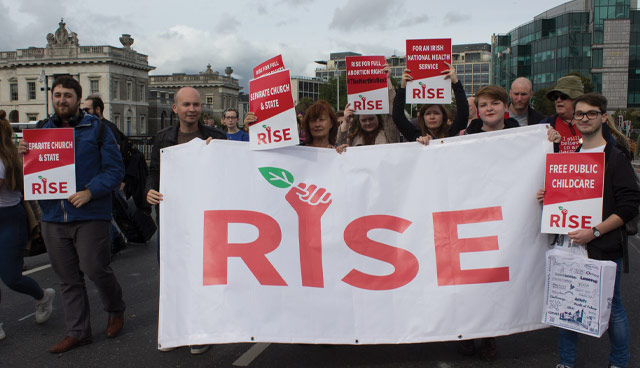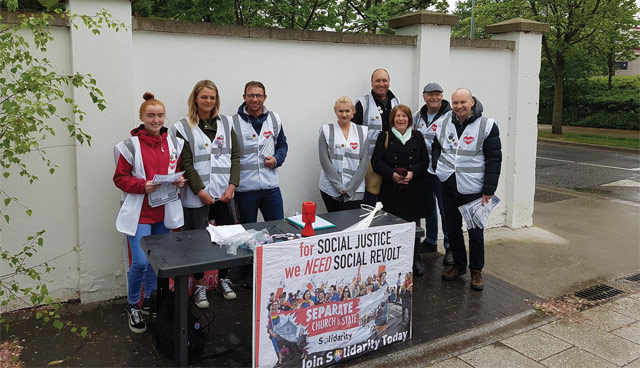Always rising

A split in the Socialist Party, the launch of the new ecosocialist group RISE and a High Court action against the Ceann Comhairle: it has been a busy second half of 2019 for Solidarity-People Before Profit TD Paul Murphy. He talks to Odrán Waldron about these events and the challenge of building a broad left movement in Ireland.
“Those who consider themselves on the left and want fundamental change will look at more division as a bad thing,” Murphy says from his Dublin South West constituency office in Tallaght. Division has become a cliché regarding the left in Ireland and while Murphy says that he agrees that it is not a good thing to have more division on the Irish left, he sets out his reasoning for leaving the Socialist Party to start his own endeavour: Radical Internationalist Socialist Environmentalist (RISE).
“Hopefully the existence of RISE changes the landscape of the radical left and creates more potential for left unity and taking a broader left initiative that all the various parts of the left could be part of,” he says. “A central difference [between the eventual founders of RISE and the Socialist Party] came down to the relationship between building a distinct Marxist force and building a broader movement of parties on the left. Those who went on to form RISE placed more emphasis on the broader movement. We think it is important to create a distinct Marxist force, which is what RISE is trying to be, but we think the best way to do that is by participating in broader movements and trying to build a broader left party.
“RISE are revolutionary socialists and we don’t hide from that, but we are interested in working with those who don’t consider themselves revolutionary socialists but agree with us now about the environment, public transport, wages, whatever. We are trying to mobilise people into struggle and trying to turn that into a broader left. It hasn’t been a good couple of decades for the left but there are openings developing.”
Yet, in Ireland’s nearest neighbour in Britain, there has been the example of the Labour Party, where a leadership and membership trying to foster a broad left movement have found themselves at odds with the majority of their parliamentary party. “There’s no question now that the active membership of the Labour Party is to the left of the Parliamentary Labour Party (PLP),” Murphy says. “As a democratic party, their PLP should reflect that. I think if RISE was transposed to Britain, we would do what we could to be in the Labour Party to argue the consistently left line and push Corbyn further. That’s where the struggle is taking place in the left and you have to be connected to that.”
The question remains that if a party such as Labour cannot command a fully coherent broad left movement, how could RISE do so in Ireland, where the more diverse party system means that those who are sympathetic to the idea of a broad left coalition are even more fractured across parties such as Sinn Féin, the Social Democrats and the Green Party, where individual feelings amongst members or candidates might not be mirrored by the leadership or the plurality of members?
“Sinn Féin are clearly angling to get into government in the south, whether the traditional establishment parties will let them in is another question. Basically, they’re going down the similar road of betrayal that the Labour Party have gone down before,” Murphy says when the question is put to him. “The Green Party is very determined to repeat past experience despite the very obvious negative consequences. Their commitment to managing capitalism doesn’t stack up with the urgency of climate catastrophe.
“The opposition is very hamstrung in this Dáil. You can put forward a motion, which can be ignored, or you can put forward a Private Members’ Bill, but over 50 of those bills are now being blocked by the money message. The way to reform it is to amend standing orders, which at the moment are more restrictive than the Constitution, to bring them out to the limits of the Constitution.”
“We accept that there are good people who turn to Sinn Féin and the Greens who do so for good reasons. I think it’s definitely the case that the majority of Sinn Féin’s urban voting base would be similar to that of Die Linke in Germany or Podemos in Spain. It’s a leftward looking anti-austerity vote, for which Sinn Féin seems the biggest and most credible vehicle. We think we need to intercept those people. If your dialogue is simply telling the truth about what those parties are, it’s not a very effective way of speaking to these people.”
If these voters are there to be intercepted and Murphy doesn’t simply want to snipe from the sidelines, how then does he propose that RISE begin to peel them away and win them over to their side? “I think the approach of placing demands on these parties is more effective than just denouncing them en masse. Saying to Sinn Féin that if they’re serious about fighting water charges, then they should call for no payment, for example,” he says.
“The argument from the Socialist Party would be that by doing that, you’re in danger of sewing illusion with regard to these parties, but when you place demands on forces that have a base in the working class, it’s a win-win. Either they don’t agree to mobilise, which exposes them to their base, or they do, which is great. There is a contradiction between [Green Party Dáil candidate] Saoirse McHugh and [Green Party leader] Éamon Ryan and if you dismiss that contradiction, I think you’re missing an opportunity.”
Parliamentary procedure has been at the centre of Murphy’s second half to the year, with his change in party status leading to questions about his status as a Solidarity-People Before Profit TD. Would Murphy stay with the six-strong cohort of himself, Mick Barry, Bríd Smith, Gino Kenny, Ruth Coppinger and Richard Boyd Barrett, a relatively strong Dáil showing for the left, or would he become the Dáil’s lone RISE TD?
He is still a member of the two-party electoral alliance, he explains, except it is now a three-party electoral alliance. “From the point of view of parliamentary procedure, there is no change of status. Solidarity-PBP is a registered political party with two components, Solidarity and People Before Profit. We get a certain amount of time, leaders’ questions, etc. That’s still the case, I’m still a member of Solidarity-PBP,” he says.
“In a formal sense, Solidarity-PBP has now gone from something that had two components to something that has three components, Solidarity, People Before Profit and RISE. What we were trying to do was minimise the sense of the Socialist Party breaking apart. We left the Socialist Party, but we’re all still in the same parliamentary party and will cooperate in the Dáil to minimise that sense of disruption. We’re all about building a mass left movement and the closest thing to that today is Solidarity-PBP, it’s very far from it, but at least it has the cooperation of two of the main parts of the radical left.”

It was a more high-profile aspect of parliamentary procedure that saw Murphy and his colleague Smith hit the headlines in November. Frustrated by the Government’s use of the money message, the controversial measure by which they can halt the progress of a Private Members’ Bill by claiming that it would require the appropriation of public funds, over which Government retains ultimate control, Murphy and Smith tabled an amendment to amend Dáil standing orders.
“The opposition is very hamstrung in this Dáil. You can put forward a motion, which can be ignored, or you can put forward a Private Members’ Bill, but over 50 of those bills are now being blocked by the money message,” Murphy says. “Our interpretation is that this blocking is based on a wrong reading of Article 17.2 of the Constitution, to basically give the Government a veto. The way to reform it is to amend standing orders, which at the moment are more restrictive than the Constitution, to bring them out to the limits of the Constitution.”
The amendment was deemed unconstitutional by the Ceann Comhairle, and Murphy and Smith challenged that ruling in the High Court. “We didn’t get an injunction to force him to not block our amendment, which didn’t surprise us because courts are hesitant about stepping into the realm of the Dáil like that,” Murphy explains. “What we did get was acceptance that there’s an arguable case that the Government has an overly expansive interpretation of Article 17.2 and that it’s using it in a way to block legislation that it doesn’t agree with and that there’s an arguable case that the Ceann Comhairle shouldn’t have blocked our amendment like that.”
With a judicial review of the matter due to take place in January and over 50 Private Members’ Bill that have passed the floor of the Dáil but fallen victim to the mechanism, this is certainly not the last we have heard of the money message.
Considering the mechanism’s effect, Murphy concludes: “It suits the Government to portray this as a very technical, legalistic argument, but there are Bills that have passed law at the second stage and have majority support, that would make a big difference to people’s lives. A few good examples are the Anti-Evictions Bill, which would strengthen the rights of tenants and stop landlords using the fact that they’re selling as a reason to evict; the Climate Emergency Bill, which would stop the extraction of further fossil fuels; the Objective Sex Education Bill, which would say that every student has the right to objective sex education regardless of the ethos of the school that they are in; the Occupied Territories Bill, which is saying that we should have an effective ban on imports of goods from the illegal Israeli settlements in the West Bank. These Bills have majority support in the Dáil and the Government is able to block them no matter how many votes they lose. If we were to win it would free up these bills to proceed and that would be very important.”





